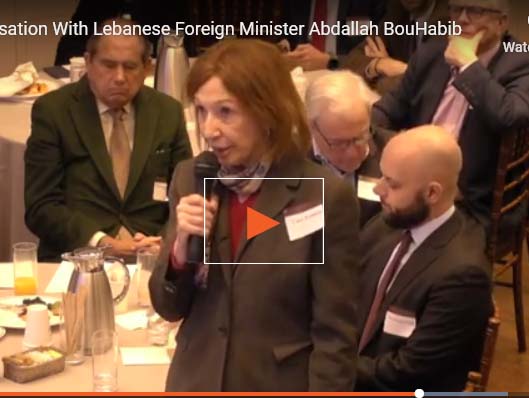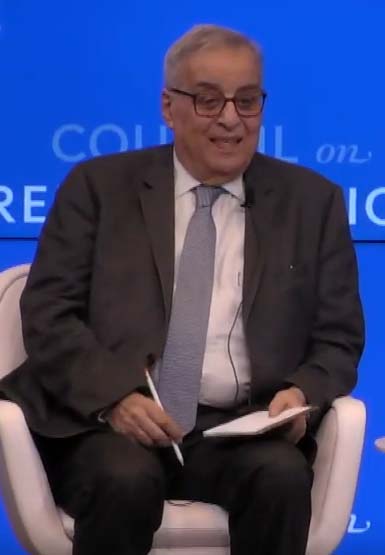By Lucy Komisar, Jan 25, 2024
I asked Lebanon’s Foreign Minister why Arab countries are not acting to protect the Palestinians. He didn’t answer the question.
Lebanon’s Foreign Minister Abdallah BouHabib spoke at the Council on Foreign Relations Monday, Jan 22. Here’s the full video. And here’s my question and the video clip.
Q: My name is Lucy Komisar. I’m a journalist.
My grandparents on both sides were Jewish immigrants to the United States over a hundred years ago, escaping repression and pogroms in Eastern Europe and in Russia. As an American Jew, I am appalled at the Israeli genocide in Gaza.
And I wonder why the Arab countries are not acting more forcefully—acting at all, it seems—to protect the Palestinians. Now you indicated, I would guess, therefore, it’s the border and it’s refugees, that you don’t want to anger the Americans or the Israelis. [He had spoken about the conflict spilling over the Lebanese border and the money paid by the Americans to care for the Palestinian refugees in Lebanon.]
What about the other countries? I have read that some—one of the reasons might be that they are getting shipments of Israeli arms and surveillance technology and don’t want to endanger that. Can you say why the Arab states are not acting strongly to protect the Palestinians?
He didn’t answer the question. He had said earlier that he would not comment on the policies of other governments.
HE SAID:
BOUHABIB: Well, this is a difficult question for a diplomat to answer, you know? (Laughs.) Because you’re—I have to give an opinion about other countries. I cannot. I’ll tell you about Lebanon. Yes, we think, you know, we are affected very much directly by the war. And we look forward to finishing this war. You know, killing each other is not—is not a solution. I think the solution is to create for whatever left of geographic Palestine, historical Palestine, 22 percent for the Palestinian people. And they have accepted that. Arafat has accepted that a long time ago. But there has to be some kind of dialogue in order to reach a final agreement on this.
And sometimes the world, especially United States, leave it to them—to the Palestinians and Israelis. I think there should be direct involvement, strong involvement, because this is a problem that really affects everybody. Not in the region, even around the world, including the United States here.
So, the best thing is to really—now is a good opportunity to find once and for all a solution for this. I mean, the Palestinians accepted that Gaza and the West Bank would be their own country. But more and more the Israelis are implanting Israelis there in the West Bank. You have a lot of settlements. And the settlements are growing. But, you know, no matter what, it cannot be—I still recall in 1967 when Israel occupied the West Bank, there were zero Israelis and three-quarters of a million Palestinians. Now there is 3.3 million Palestinians and less than three-quarters of a million Israelis. So, they cannot beat them. I don’t know what’s the—you know, the issue.
And it is not—you know, 1948 is not going to happen again. This is what the—especially this Israeli government that exists now should understand. I mean, there’s—the Palestinians are not going to go away from being in the West Bank and in Gaza. So, the best way is to deal with them and try to see things are not the same as it used to be in 1948. In 1948, they left thinking that it’s in a couple of weeks, you know, they were thinking still of numbers. Arabs are so many, Israelis were so small, you know. But this is not—they didn’t take into consideration technology that even existed there is different. Now, they’re not going to leave their country. They feel that they are Palestinians. And wherever they go in the Arab world, they are still Palestinians.
I think they assimilate more in the United States than they assimilate in Arab countries, to say the truth about it. I mean, Palestinians in Lebanon—I’ll give you an example. Since 1948, they have been in Lebanon. Of course, they started like a hundred and something thousand. Now there are over half a million. But they’re still Palestinians. They still have the Palestinian accent. You can tell a Palestinian from whatever he tells you good morning. So, they need—they need a country of their own. And I think the sooner the better for all people in the region.
The Arabs have accepted Israel. I would say before ’67, or before ’73 they did not. But now they do. And there are six or seven Arab states that have recognized Israel, including Egypt and Jordan and the UAE and Bahrain and Morocco. They’ve all accepted. So, you know, we look forward to a peaceful situation to people accept each other and live together. Live together, I think, it’s good for everybody.
Nobody else at the Council meeting said anything about Israel’s genocide in Gaza. One person, raising the issue of anti-Semitism, pointed to a pro-Palestinian march in New York. Others asked about economic issues.




perhaps…wahabbism is a wonderful lock on people. While the sheikhs freely do constant deals investing with Wall Street and hang out in Western capitals. Saudi, UAE, Qatar, Paquistan, Turkey…..not what they seem. Nasty stuff.
Pingback: “The Ally” Israeli-Palestinian argument is a riveting college campus drama : The Komisar Scoop